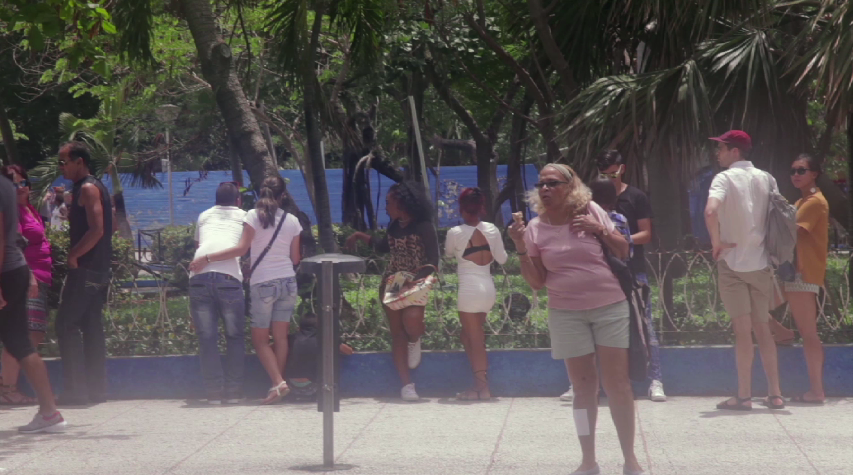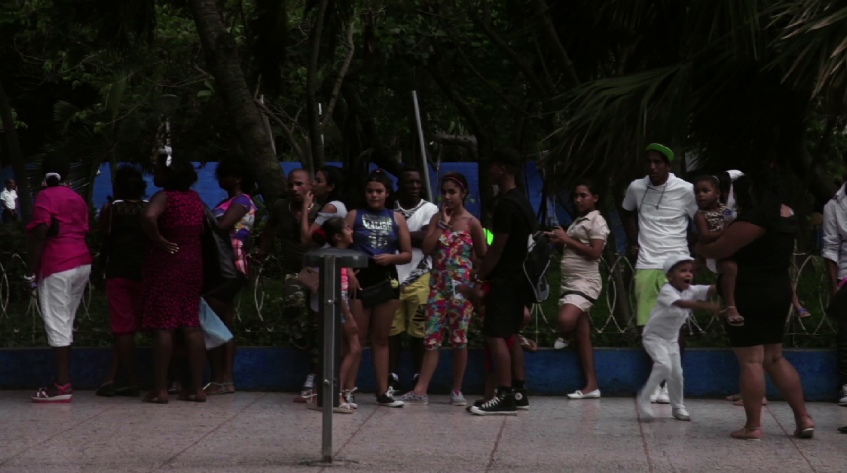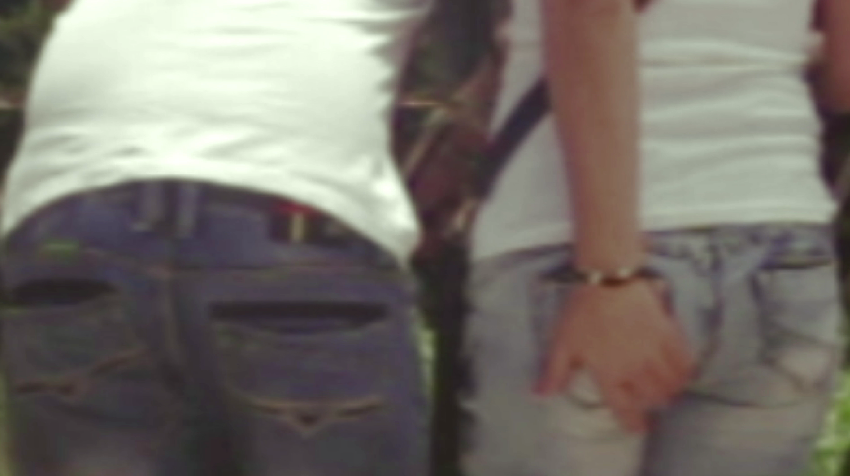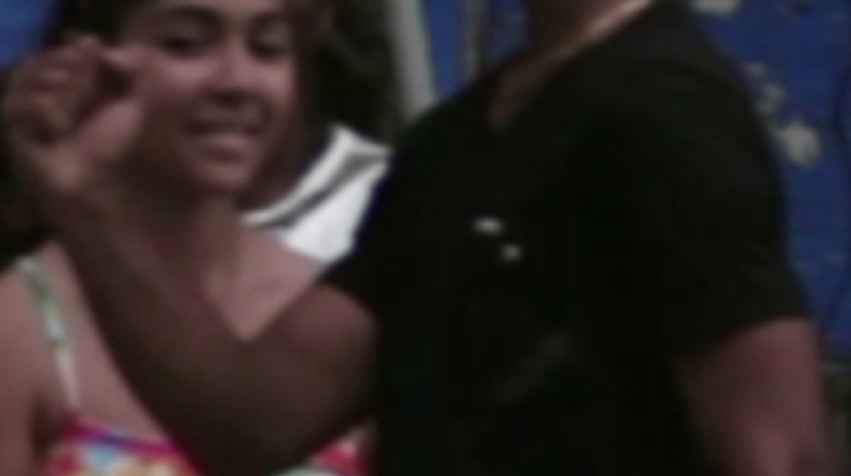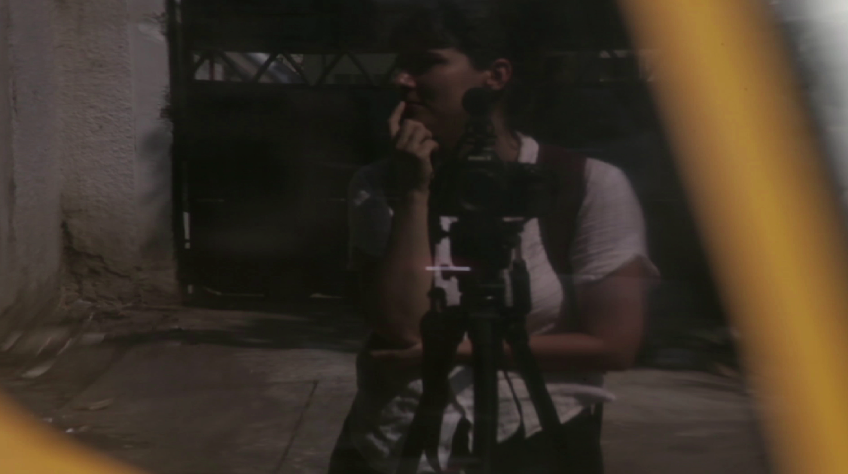 Waiting for ice cream: an interview with Juliana Lobo (2019)
Waiting for ice cream: an interview with Juliana Lobo (2019)
We met at the International Film School in Cuba, Juliana was doing a master’s degree in “alternative cinema,” though astonishingly, she had never made a movie before. The course serves up a visiting artist every two weeks, who create frames for dance movies, stop motion animations, experimentalist docs. Doing is knowing. Whenever Juliana laughed she would close her eyes, as if it were a blinding secret. She wanted to make a movie “about” Cuba, but how to begin the monumental task when she had arrived so recently from Sao Paolo, little more than a tourist then, or at least a newcomer.
Mike: In Coppelia (23 minutes 2018), you return to a single frame over and over again, shooting across days and nights in Havana, looking at citizens waiting in line for the famous ice cream store. Why this store, this line up?
Juliana: One of the things that caught my attention in Cuba were the lines — there were lines everywhere, people stay forever in them, but they don’t get mad about waiting too long. This interest in lines led me to Coppelia, an ice cream store located at a busy corner in Havana, where the line is an event. People stay longer in line than inside the place, you can wait for one hour on weekends, and during this waiting people enjoy themselves.
Coppelia is part of a state franchise created by Fidel. The Havana location is the first one, but every city of Cuba has one of its own. Ice creams are sold at popular prices, so going to Coppelia is a common leisure pursuit.
I filmed Coppelia because I was stunned by the openness of public expression. While I was filming from the other side of the street, I witnessed people dancing, fighting, chatting, kissing, playing games, enjoying moments with their family, showing themselves to the camera and not bothered by the camera at all. Public space is the stage of both public encounters and private moments. I saw it as freedom and fairness of leisure. Although Cuban live with many kinds of limitations (material, leaving the country, internet), the equality of ordinary leisure and basic services (school, health services, housing) appears as a richness, compared to the oppressive and unfair systems we have in Brazil.
Even the island’s slow internet transition is made in public places (in the internet parks), though mostly the internet is restricted to a small group. The lack of internet on the island makes public relations singular and unusual.
I kept filming in the same place, and every time I reviewed the material, I was amazed to discover more. It was an exercise of coming closer to people, even though I was always the same distance. I tried to show things I see in people, the small details that tell me something about who they are.
Mike: Your film offers a series of views within the same frame, and then you revisit those views, often zooming in to show us close ups, moments of an original image. There are faces and hands, but most often the bodies of women, which you grant a fascinated attention.
Juliana: I would say that women is a special theme for me, it is a natural gaze almost like a mirror — a way to understand myself.
In general, women are very strong in Cuba, they forward opinions, they seem to have an openness about their sexuality, and occupy an important role in their homes. However machismo is very strong, street harassment is systematic and annoying, men feel free to comment about your beauty and body even in a work context. When I talked to some woman about it, they didn’t recognize that as sexism. Both men and women in Cuba told me: “Because women in Cuba know how to respond to the harassment of men, it’s not a problem for them.”
Mike: What brought you to the International Film School in Cuba?
Juliana: I’ve done art direction for films for more than ten years, but before going to Cuba I had never made a film of my own. It was also a way to stop my routine and find my voice and think about what I wanted to say. I did not figure it out, but now I think about it all the time. The isolation in Cuba was a very special tool to think about yourself, and also built strong relations with people in the course (we studied, ate and lived together). These relationships empowered new choices and discoveries.
I always work hard to know exactly what I am filming, and what am I really talking about, but there is something more that you only get later. Putting images together creates something poetical and unexpected that becomes more important than the first idea.
Mike: What is the movie scene like where you are in Brazil? Is there support, places to show, a “community” of makers or independent spaces that are interested?
Juliana: In the last ten years national funds were directed to embrace different parts of Brazil and authorial works. Cinema was becoming more diverse in its themes and styles and a wide range of filmmakers were supported, unfortunately that is changing quickly with the new government. Many funds are closing for film production and festivals, and there is a shift to prioritize commercial films.
Mike: After a coup deposed Brazilian president Dilma Rousseff, and Lula was locked up in jail, the extremist Jair Bolsonaro was elected. Does it make you feel differently about your own practice or the place of culture in this moment of confrontation?
Juliana: Brazil is in a really difficult moment right now. We have elected a fascist and people on the streets are starting to be aggressive with minorities. I’m really anxious, it’s hard to sleep. I’m so worried about the future of Brazil. At the moment, I have just finished doing art direction on an interesting feature film, and might take the month of December to do some of my own work, that would be a good thing.
I’m thinking of new projects, trying to film in super 8. I’m reading Latin American history and novels, and also some theories of de-colonization/post-colonization. I want to write a comparison between my childhood and my grandmother’s childhood (at least what she told me when she was still healthy). It’s making me think a lot about personal and public histories. Things must go on.
Biography
After receiving a BA in Design, Juliana Lobo (Brazil) earned her Master’s degree in Alternative Cinema from the International School of Film and Television of Cuba. Working as an art director, her recent projects include the feature-films All the dead ones, directed by Caetano Gotardo and Marco Dutra, Desterro, by Maria Clara Escobar both in postproduction. Her praxis in cinema was developed through her work in the art department of different arthouse projects, recognized by international festivals, such as Joaquim by Marcelo Gomes, The Second Mother by Anna Muylaert, and Sandra Kogut’s Campo Grande. Her first short Coppelia is an investigation of the public space in Cuba, it premiered in Havana Film Festival 2018. She is also the co-writer of First act, Matheus Parizi’s short-film premiered at IFFR 2019.
